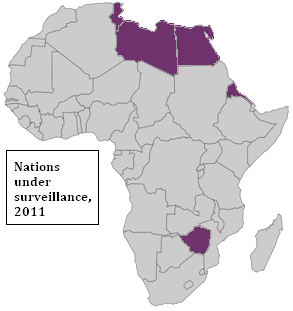Under surveillance: Egypt, Libya, Tunisia, Eritrea (and maybe Zimbabwe)
Reporters Without Borders (RSF), the world’s leading watchdog of press freedom, does an excellent job monitoring real-time media censorship. Since 2005 the organization has issued an annual report highlighting nations that egregiously censor the Internet and punish cyber-activists. The so-called “Enemies of the Internet” report has always included African nations – until this year. Following North African regime changes in 2011, RSF has moved perennial Internet censors Egypt, Tunisia, and Libya to the lesser “under surveillance” category. These North African nations are now in a league with Eritrea (and perhaps Zimbabwe) who, in turn, have been on-and-off RSF’s surveillance watch list.
Still, inclusion on the watch list does not mean a nation allows unfiltered Internet access to its people. Egypt and Tunisia, both stalwart “enemies of the Internet” have recently seen the overthrow of a regime, but must still eliminate the possibility for future censorship. Including Internet access as a constitutional right would be a great next-step for these nations. In addition, both Egypt and Tunisia need to remove the technical capabilities of Internet filtering. Libya, off the list since 2005, has returned to the “under surveillance” category as the nation enters a period of civil war and near-complete Internet blackouts. If the RSF list were made current, Libya would undoubtedly rank as one of the worst Internet censors in history. Eritrea continues to operate under a dictatorship that is fearful of following in the footsteps of its North African neighbors. In all likelihood Eritrea will again make the dubious “under-surveillance” list in 2012. Steps to free the Internet would mean a combination of 1) a new regime 2) privatization of the telecoms industry 3) shift away from cyber café access. Finally, although not on an RSF list for two years, Zimbabwe’s ruling party continues to intimidate opposition by using the Internet and should be carefully watched.
Reporters Without Borders provides the reasoning behind their assessment of Internet censorship. Below are the methods of how each African nation on the list has censored its Internet.
2005:
15 enemies (2 African):
Libya:
- Nearly 1 million people online (one-sixth of the population)
- Internet filters installed by the regime
- Prison sentencing for cyber-dissidents
Tunisia:
- Ben Ali’s family has Internet monopoly within country
- Widespread filtering of online opposition and news sites
- Discourages use of webmail vs. email clients
- Prison sentencing for cyber-dissidents
- Hosted ITU WSIS in November 2005
10 countries to watch (2 African):
Egypt:
- Minor censorship of Internet since 2001
- Surge in blogging appears to trouble government
Zimbabwe:
- Government rumored to have plans to spy on Internet using Chinese technology
2006:
13 enemies (2 African):
Egypt (downgraded from 2005):
- Little online filtering
- Extreme pressure against pro-democracy blogs
- New ruling allows authorities to shut-down websites that pose a threat to national security
Tunisia:
- Internet cafés are state-controlled
- Enforce self-censorship of opposition editors
Removed from enemies list:
Libya:
- Internet is no longer censored
- No cyber arrests since March 2006
2008:
15 enemies (4 African):
- Egypt
- Ethiopia
- Tunisia
- Zimbabwe
2009:
12 enemies (2 African):
Egypt:
- 12.9% Internet penetration, but ADSL users doubled year-over-year
- Cyber cafés monitored by government
- Personal data required to access WiFi networks
- Social networks “taking on the role of trade unions”
- Multiple cyber-dissidents in jail
Tunisia:
- Cyber cafés continue to be monitored
- Extreme web filtering in place
- Multiple cyber attacks on news sites
- Human rights activists face difficulties in accessing email
10 countries under surveillance (2 African):
Eritrea:
- 42 cybercafés
- EriTel owns all network infrastructure and limit services like Skype
- Government attempts to block expatriate sites
Zimbabwe:
- Government meddles with Internet during election periods
- State can intercept email communications
2010:
12 enemies (2 African):
Egypt:
- Nearly 17 million Internet users
- Blogs emerge as effective tools for mass mobilization
- Government is increasingly involved in anti-netizen efforts
Tunisia:
- Widespread Internet adoption but increasing censorship
- Facebook blocked in August 2008, but President’s page has 120,000 fans
- Blocked sites display 404 error rather than 403 error
11 countries under surveillance (1 African):
Eritrea:
- Continued intimidation of Internet users
- Uses two official sites for propaganda
- Two ISPs block critical sites and YouTube
2011:
10 enemies (0 African):
16 countries under surveillance (4 African):
Egypt:
- Heavy filtering and Internet blockage during end of Mubarak’s rule
- Increase in citizen participation in politics is positive
- Mubarak’s online surveillance system is still not entirely dismantled
Eritrea:
- Government is ready to shut-down national Internet at any sign of unrest
- Continued intimidation
Libya:
- Regime attempts to prevent access to civil war news and wants to disrupt opposition while using Web for its own propaganda
Tunisia:
- Sites are no longer blocked and the interior ministry is working with the public to encourage Internet usage
- Censorship technology still remains
- Constitution needs Internet as a basic right, ISP market should be opened













 Twitter
Twitter Facebook
Facebook Pinterest
Pinterest
[…] unchanged ranking of Egypt, Tunisia, and Eritrea in 2012 comes as no surprise. Last year, we noted how Egypt and Tunisia must still eliminate the possibility for future censorship. Our guess is that […]
[…] Without Borders has delivered consistent coverage of ETC. In 2008, Ethiopia made the group’s “Enemies of the Internet” […]